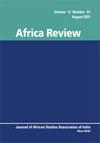The Dynamic Links between Renewable Energy and Environmental Quality in an Insecure Situation
IF 0.5
Q4 AREA STUDIES
引用次数: 1
Abstract
The world faces two main problems: environmental degradation and the growing number of terrorist attacks. This study provides new perspectives by evaluating the links between environment quality, renewable energy consumption, terrorist attacks and the rents of natural resources for forty-six African countries over the period 1991–2017. We applied a heterogeneous panel data approach and second-generation econometric techniques, which took into account cross-sectional dependence and heterogeneity. The long-term effects were obtained by AMG and CCMG estimators. The results confirmed the existence of a cross-sectional dependence between the individuals in the panel. In addition, the long-term relationship confirms the existence of an inverted U-shaped curve between CO2 emissions and the level of GDP. Renewable energies stimulate the improvement of environmental quality in the long term whereas terrorist attacks contribute to environmental degradation. Thus, policymakers are called upon to promote renewable energies and to implement good governance of rents.不安全形势下可再生能源与环境质量的动态联系
世界面临着两个主要问题:环境恶化和恐怖袭击日益增多。本研究通过评估1991-2017年期间46个非洲国家的环境质量、可再生能源消费、恐怖袭击和自然资源租金之间的联系,提供了新的视角。我们采用了异质性面板数据方法和第二代计量经济学技术,其中考虑了横断面依赖性和异质性。通过AMG和CCMG估计器获得了长期效应。结果证实了面板中个体之间存在横断面依赖性。此外,长期关系证实了二氧化碳排放量与GDP水平之间存在倒u型曲线。从长远来看,可再生能源促进了环境质量的改善,而恐怖袭击则导致了环境的恶化。因此,政策制定者被呼吁促进可再生能源并对租金实施良好的治理。
本文章由计算机程序翻译,如有差异,请以英文原文为准。
求助全文
约1分钟内获得全文
求助全文
来源期刊

Africa Review
AREA STUDIES-
CiteScore
1.80
自引率
12.50%
发文量
22
期刊介绍:
Africa Review is an interdisciplinary academic journal of the African Studies Association of India (ASA India) and focuses on theoretical, historical, literary and developmental enquiries related to African affairs. The central aim of the journal is to promote a scholarly understanding of developments and change in Africa, publishing both original scholarship on developments in individual countries as well as comparative analyses examining the wider region. The journal serves the full spectrum of social science disciplinary communities, including anthropology, archaeology, history, law, sociology, demography, development studies, economics, education, gender studies, industrial relations, literature, politics and urban studies.
 求助内容:
求助内容: 应助结果提醒方式:
应助结果提醒方式:


